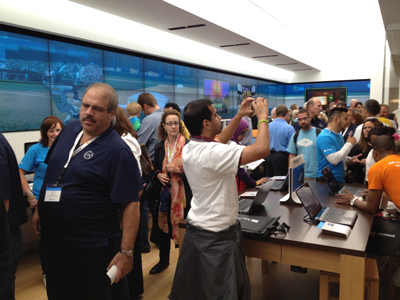What Can the Microsoft Store Do for You?
I've never attended the grand opening of a store and I was intent to keep it that way until I was invited to the ribbon-cutting ceremony for the opening of the Microsoft Store in Huntington Station, N.Y. Given that I live 15 minutes from the site of the new store at the Walt Whitman Mall, I wanted to take a look at how Microsoft's retail push might boost its profile among consumers and what impact it will have on partners.
First of all, the store I visited was quite slick. Huge video monitors encircle the wall that encompasses the entire internal perimeter of the store with panoramic, highly polished videos promoting various Microsoft offerings including Xbox and Office. Not surprisingly, every type of PC form factor was on display, from desktops to low-cost notebooks (most in the $699 range), to Ultrabooks and, of course, touch-based tablets (though only a handful at the moment).
 |
| Inside the Microsoft Store at Huntington Station. Credit: Jeffrey Schwartz |
Those looking for the latest PCs and tablets will surely find them at the Microsoft Stores and while prices will be competitive, I saw nothing to suggest that the nearby Best Buy or Staples will be left in the cold. In fact, I did a quick price check of a few machines on display at the Microsoft Store and compared it to Best Buy's online prices (which typically are the same as their in-store prices):
- A Samsung Series 7 tablet powered by an Intel Core i5 processor, with a 128 GB solid state drive (SSD), 4 GB of RAM running Windows Pro 7 (upgradeable to Windows 8) costs $1,200 at the Microsoft Store. A search of Best Buy listed a similar system for $1,124.98 today with the most notable difference being the listed system only has a 64 GB SSD drive.
- A Dell XPS PC with a 1 terabyte drive and 8 GB of RAM and a 27-inch display cost $1,499 at the Microsoft Store but was on sale at Best Buy for $1,049, though it only had 6 GB of RAM.
- And a similarly configured Lenovo A720 at the Microsoft Store is priced at $1,699 with a 750 GB hard drive, versus $1,329 at Best Buy for a system with a 500 GB drive.
I should point out I didn't do a feature-by-feature comparison, but the point is Microsoft doesn't appear to be using its store to undercut other retail channels. Nevertheless, the stores will probably highlight the latest products available from Microsoft's OEM partners.
Of course, Xbox fans will delight in seeing the latest hardware and demos and there is a nice selection of peripherals for the gaming system as well as for PCs. A whole section is devoted to input devices ranging from game controllers to mice, keyboards and flash drives.
In addition to hardware and software, Microsoft is using its stores to sell services to individuals and small businesses. Microsoft Assure is the two-year protection plan the company is pushing with the systems it sells typically for around $169 or $199 depending on the hardware (some plans may cost more). The stores offer a variety of other services including Premium Tech support plans, Extended Diagnostics, backup, tune-ups, virus and spyware removal and, for small businesses, Microsoft Signature Professional. Priced at $399 for up to five PCs (each additional system is $79), Microsoft Signature Professional includes ongoing support, setup and training.
Microsoft is hoping to use the stores to engage its partners, as well. Each store will recommend partners to address advanced services such as setting up a storage network or deploying a server or providing Office 365 implementations. Microsoft is still addressing the specifics of how it will select partners. I was told that they can use a small theater in the back of the store to give presentations.
In a small corner were some Windows Phones from Nokia, HTC and Samsung but it bears noting that none of those on display will be upgradeable to Windows Phone 8. While I realize Microsoft has to keep promoting Windows Phone, it concerns me that the stores are selling phones that are going to become obsolete in the not-too-distant future. I think the stores need to make it clear when they buy these phones that they won't be upgradeable to Windows Phone 8.
The Microsoft Store is very similar in concept to the Apple Store, which set the bar not only for selling technology but is changing the dynamics of all retailing. The BYOD trend makes it necessary for Microsoft to raise its profile among consumers, especially in light of Apple's unprecedented success with the iPads, which have a two-and-a-half-year lead on tablets running Windows 8.
Indeed, Microsoft's stores will truly take on their intended shape later this month when Windows 8 ships. Of course, that begs the question of how much emphasis the stores will give to Microsoft's first-ever branded PCs, the Surface. Surely it won't be trivial, but to what extent will they obscure systems from Microsoft's OEM partners? While Microsoft isn't saying, the company must know it needs to give OEMs a fair shake. And presuming OEMs offer numerous different form factors, Microsoft's key goal is to showcase Windows 8 (and Windows RT), not simply its own devices.
Microsoft's future is riding on the success of Windows 8 and its new stores will allow it to strut its stuff better than anyone. While the stores are just one small avenue, if you happen to be in proximity of any of them, check one out and see what it can do for you.
See Also:
Posted by Jeffrey Schwartz on October 01, 2012